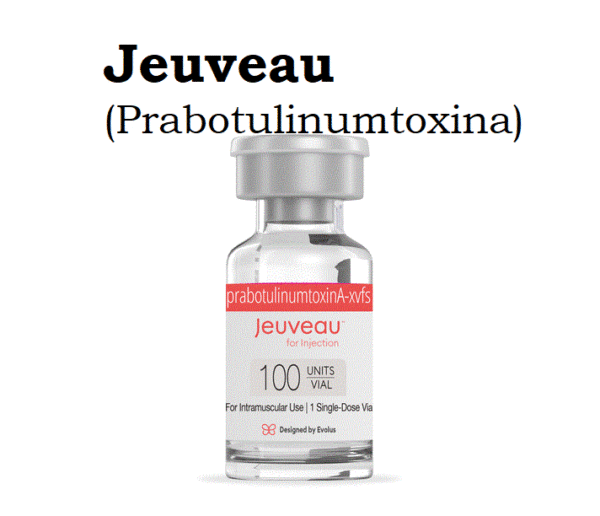Acetylcholine release inhibitor and neuromuscular blocking medication Jeuveau (Prabotulinumtoxina) is used to cure wrinkles and frown lines.
Jeuveau (PrabotulinumtoxinA) Uses:
-
Glabellar lines:
- A transient reduction in the severity of moderate to severe glabellar lines in adult individuals who had corrugator and/or procerus muscle activation.
Jeuveau (Prabotulinumtoxina) Dose in Adults
Note:
- Consider the cumulative dose while treating patients with prabotulinumtoxinA, in cases where other botulinum toxin products have been used for the treatment of other indications approved for those products.
Jeuveau (Prabotulinumtoxina) Dose in the treatment of Glabellar lines:
- IM: For a total dose of 20 units (0.5 mL) every treatment session, inject 4 units (0.1 mL) into each of the 5 sites (2 injections into each corrugator muscle and 1 in the midline of the procerus muscle).
- Do not administer more often than three months apart.
Jeuveau (Prabotulinumtoxina) Dose in Children
Not indicated in children.
Jeuveau Pregnancy Risk Category: Not assigned
- In animal reproduction studies, adverse events were not reported.
PrabotulinumtoxinA is used during breastfeeding
- It is unknown if prabotulinumtoxinA can be found in breast milk.
- According to the drug manufacturer breastfeeding during treatment should be considered in light of the risks to infants and the benefits to mothers.
Jeuveau (Prabotulinumtoxina) Dose in Kidney disease:
- There are no dosage adjustments provided in the drug manufacturer's labeling.
Jeuveau (Prabotulinumtoxina) Dose in Liver disease:
- There are no dosage adjustments provided in the drug manufacturer's labeling.
Side Effects of Jeuveau (PrabotulinumtoxinA):
-
Central nervous system:
- Headache
-
Hematologic & oncologic:
- Leukocytosis
-
Ophthalmic:
- Blepharoptosis
-
Respiratory:
- Upper respiratory tract infection
- Dyspnea
-
Gastrointestinal:
- Dysphagia
Contraindications to Jeuveau (PrabotulinumtoxinA)
- Hypersensitivity to botulinum toxins or any other component of the formulation
Jeuveau Warnings & Precautions
-
Anaphylaxis or hypersensitivity reactions
- Severe and/or acute hypersensitivity reactions have occurred, and these have included urticaria, soft tissue edoema, dyspnea, and serum sickness.
- Stop using the medication immediately if you experience an adverse reaction.
-
Formation of antibodies:
- Antibody formation and efficacy loss may be prevented by administering higher doses or more frequently.
-
Cardiovascular events
- Patients with heart disease should be cautious. Arrhythmias and myocardial injury (some fatal) have been reported.
- These patients were at risk for developing cardiovascular disease, including pre-existing conditions.
-
Dysphagia
- Problems breathing or swallowing may result with the medication. This could go on for several months and need the insertion of a feeding tube.
- Aspiration may happen as a result of severe dysphagia. When treating individuals whose ability to swallow or breathe is already impaired, this is a major concern.
- Small neck muscle mass and bilateral injections into the sternocleidomastoid muscles are two risk factors.
-
Ophthalmic effects
- Botulinum toxins can cause dry eye, decreased tear production, decreased blinking, and corneal problems. If these symptoms persist, an ophthalmologic evaluation may be necessary.
-
Systemic toxicities: [US Boxed Warning]
- It has been reported that botulinum toxins can spread far beyond the injection site.
- Dysphagia and breathing problems have been reported, as well as dysphagia and dysarthria.
- These symptoms can be observed from hours to weeks following injections.
- Upper limb spasticity in children is one of the unapproved applications, however approved indications demonstrate that symptoms typical of toxins spreading have been seen at dosages comparable to or below the maximum total advised dose.
- If you have symptoms such as speech or breathing problems, seek immediate medical attention.
-
Neuromuscular disease
- Patients who have Lambert Eaton syndrome, myasthenia gravis, or other neuromuscular junction illnesses such as amytrophic lateral syndrome should exercise caution.
- Adverse events such widespread muscle weakness, diplopia, ptosis, dysarthria, severe dysphagia, and respiratory compromise may be more likely to occur.
-
Respiratory disease
- Patients with pre-existing respiratory conditions should be treated with extreme caution
- Botulinum Toxin treatment may cause the weakness of accessory muscles, which are vital for patients who need to maintain adequate ventilation.
- There have been severe breathing problems, including respiratory failure.
- Due to their impaired respiratory capacity, patients with severe dysphagia are more susceptible to aspiration.
PrabotulinumtoxinA: Drug Interaction
Note: Drug Interaction Categories:
- Risk Factor C: Monitor When Using Combination
- Risk Factor D: Consider Treatment Modification
- Risk Factor X: Avoid Concomitant Use
Risk Factor C (Monitor therapy) |
|
| Aminoglycosides | May increase the neuromuscular blocking effects of products containing botulinum toxin. |
| Anticholinergic Agents | Merchandise Containing Botulinum Toxin may strengthen an anticholinergic agent's anticholinergic action. |
| Botulinum Toxin-Containing Products | May increase the neuromuscular blocking effects of other products containing botulinum toxin. |
| Muscle Relaxants (Centrally Acting) | May intensify the negative or harmful effects of products containing botulinum toxin. In particular, there may be a greater likelihood of developing muscle weakness. |
| Neuromuscular-Blocking Agents | Neuromuscular-Blocking Agents' ability to block neuromuscular activity may be improved by products containing botulinum toxin. |
Monitoring parameters:
- Difficulty with swallowing, speaking, breathing, or muscle weakness or paralysis in areas other than the targeted area;
- ophthalmic effects (eg, eye dryness, eye irritation, photophobia, or changes in vision).
How to administer Jeuveau (PrabotulinumtoxinA)?
IM:
- To administer intramuscularly, use a needle of 30-33 gauge.
- Each site should get two injections into each corrugator muscle and one injection into the Procerus muscle in the middle.
- Make sure the injection dose is accurate and, if at all feasible, keep it to a minimum.
- Injections close to the levator superioris muscle should be avoided by patients with larger brow depressor complexes.
- The bony supraorbital line should be at least 1 cm above the location of lateral corrugator injections.
- Toxic drugs shouldn't be injected any closer than 1 cm from the middle brow.
- Additional details regarding administration can be found on the labeling of the drug manufacturer.
Mechanism of action of Jeuveau (PrabotulinumtoxinA):
- A neurotoxin created by Clostridium botulinum is prabotulinumtoxinA, sometimes referred to as botulinum toxinA.
- It binds to the acceptor sites on motor nerve terminals, enters the nerve terminals, and prevents Acetylcholine release.
- The neurotoxic breaks down the protein SNAP-25 as a result of this. The effective docking and release of cholinergic vesicles from nerve terminals depends on this protein.
- Therapeutic doses of prabotulinumtoxinA are delivered intramuscularly. Muscles suffer from partial chemical deervation as a result.
- Additionally, muscle atrophy may occur, axonal sprouting might develop, and extra-junctional Acetylcholine receptors could develop.
- Evidence suggests that muscle reinnervation may occur, slowing down the process of muscle denervation caused by prabotulinumtoxinA.
International Brand Names of prabotulinumtoxina:
- prabotulinumtoxina-xvfs
- Jeuveau
PrabotulinumtoxinA Brand Names in Pakistan:
No Brands Available in Pakistan.




 Injection.webp)